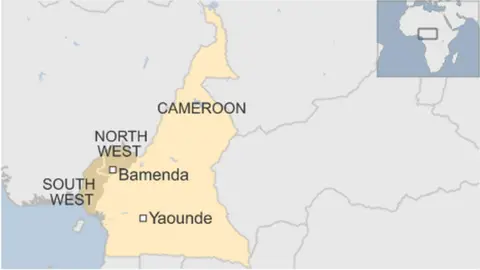Cameroon bans 'opposition' English-language TV channel
 Scbc
ScbcCameroon has banned people from watching a popular television station that says it represents the interests of the English-speaking population.
Cable TV providers have been told they will be sanctioned if they do not stop broadcasting the South Africa-based channel, SCBC.
But content can still be viewed online.
There have been months of protests by Cameroon's Anglophone population against what they say is discrimination by the Francophone majority.
Some activists are accused of campaigning for a separate country.
SCBC, or the Southern Cameroons Broadcasting Corporation, airs programmes about the history and culture of the Anglophone region, as well as interviews with exiled lawyers and documentaries about human rights abuses in Cameroon, a BBC correspondent says.
Communications Minister Issa Tchiroma accused the channel of broadcasting seditious and hateful programmes, adding that it is being used as a propaganda tool for an outlawed political movement.
SCBC programme co-ordinator Raymond Sama told the BBC's Focus on Africa that the ban would be used to "terrorise our people", adding that he did not recognise the authority of the government.
The government has tried and failed to persuade the South African authorities to stop SCBC broadcasts.

In theory, people could be arrested for watching the channel, our correspondent says, as some have already been detained for having videos and text messages on their phones relating to the Anglophone protests.
The divisions in the country date back to the post-colonial settlement.
Cameroon was colonised by Germany and then split into British and French areas after World War One.
Following a referendum, British-run Southern Cameroons joined the French-speaking Republic of Cameroon in 1961. The area is now divided between North-West and South-West regions.
A second British-run area, Northern Cameroons, voted to join English-speaking Nigeria.
